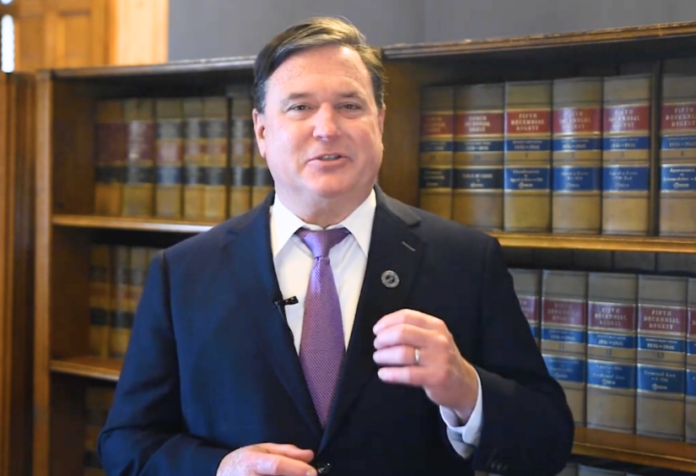
By Whitney Downard
Indiana Capital Chronicle
INDIANAPOLIS — Indiana Attorney General Todd Rokita on Tuesday inserted himself into the debate over gender-affirming care for minors – though recent testimony documented that surgeries on children don’t occur in Indiana.
He said there has been “a series of disturbing reports” nationally alleging such procedures and sent letters to several Indiana medical facilities demanding more information on “alleged sterilization of Hoosier children.”
“Our kids are precious gifts from God,” Rokita said in a statement. “We should all be concerned about the physical and chemical procedures being performed upon these minors, which in most cases are irreversible.”
While surgeries are considered a permanent method of sterilization, puberty blockers — used to delay early onset puberty for decades — are generally considered to be reversible. Hormone replacement therapies are also considered to be somewhat reversible, depending on the length of time someone has used them.
Testimony over several anti-transgender bills in the Statehouse hasn’t yet produced a child who underwent a gender-affirming surgery, which can include double mastectomies, phalloplasties and hysterectomies, in Indiana. The Riley Children’s Hospital Gender Health Clinic, the state’s only pediatric hospital, has previously said it doesn’t perform surgeries on minors.
National numbers show that surgery is uncommon for minors, with just 56 genital surgeries among 30 million minors between 13 and 17 documented between 2019 and 2021. Over that same period and age range, 776 mastectomies were performed.
The American Civil Liberties Union of Indiana rebuffed Rokita’s letters, saying these clinics provide medically necessary care to their patients and tying it to the slew of anti-transgender bills advancing in this session.
“We are very concerned about the Constitutional implications of gender affirming care restrictions moving through the Indiana General Assembly, and the letter that the Attorney General distributed to Indiana clinics attempts to validate this unjustified discriminatory legislation,” said Ken Falk, the ACLU of Indiana legal director.
The clinics, the organization said, have no legal obligation to respond to Rokita’s letter. His office investigates doctor misconduct but the procedures he questioned are legal and the facilities are licensed by the Indiana Department of Health.
A slew of anti-transgender bills
Dubbed by advocates as the “slate of hate,” lawmakers have advanced several measures directed at transgender minors.
Notably, a bill banning all gender-affirming health care passed the Senate, even though most of the committee testimony came from out-of-state participants and national anti-trans activists. The bill would bar puberty blockers, hormone replacement therapies and surgeries – though the bill author, a doctor, acknowledged that blockers and hormone therapies would still be allowed for other children.
Another bill would require schools to notify parents if their child asks educators to use a different name or pronoun. Another would bar the Indiana Department for Child Services from removing a child “solely” due to a parent disagreeing with a child’s transgender identity – something the agency says it already doesn’t do and draws entirely from one family’s court case.
Questions contained in Rokita’s letter
Rokita’s letter, shared by his office, went to several healthcare entities, including Riley Hospital for Children, IU Ball Memorial Hospital, IU School of Medicine, Eskenazi Hospital, Mosaic Health and Healing Arts and all Planned Parenthood Centers in Indiana.
Rokita appeared as a guest on Fox & Friends Tuesday morning, insinuating that parents aren’t giving fully informed consent or are being pushed into it by facilities and clinics as a “money-making” ploy.
His letter asks clinics to document their gender-affirming care, including prescriptions and surgeries and also asks about parental consent – something already required for a minor undergoing surgery in Indiana – and the “revenue” generated by these treatments.
Rokita questions go beyond medical care, and include whether providers suggest “the use of or provide access to mechanical devices such as “chest-binders” or “genital tucking underwear” to minors? How many such devices were distributed to children in each of the last three years?”
He requests that the healthcare institutions respond by March 27.
Indiana University Health released a statement saying its gender health program provides care by licensed medical, psychology and social work professionals and is “designed to support the medical and emotional needs of our patients and their families. The program follows evidence-based guidelines. Each patient’s care plan is designed to address the patient’s individual needs with parent/guardian involvement and requires consent at every stage. Our standard of practice is not to conduct gender-affirming care surgeries on anyone under the age of 18.”




